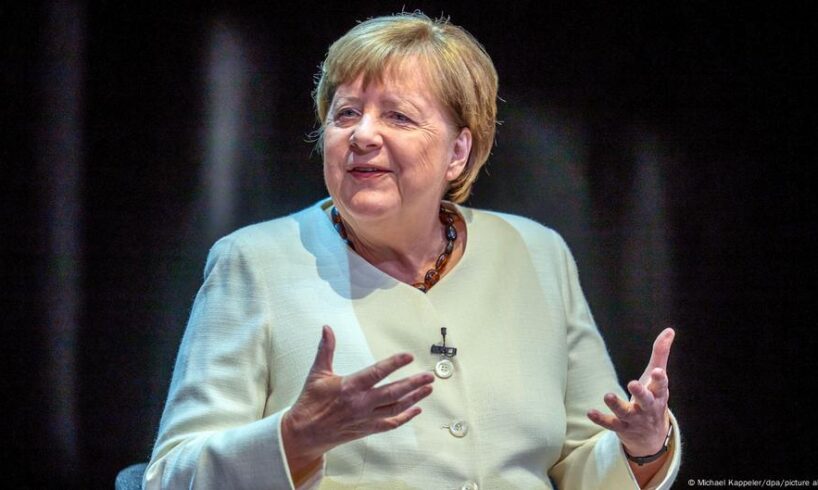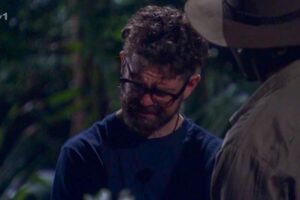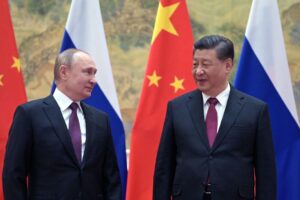
Whenever Angela Merkel speaks out from her political retirement, people listen attentively.
This was particularly true when she discussed the events leading up to Russia’s attack on Ukraine in February 2022, in a recent interview with the independent Hungarian news portal Partizan.
Merkel, who was German chancellor until December 2021, had a decisive influence on European policy toward Russia.
In the interview, Merkel reflected on the months leading up to the Russian invasion of Ukraine. She described how the coronavirus pandemic had complicated communication with Russian President Vladimir Putin. She also discussed how she had initiated talks between the EU and Russia in June 2021, with the intention of stabilizing the fragile ceasefire between Ukraine and Russia.
According to Merkel, she wanted “us as the European Union to talk directly to Putin. This was not supported by some countries, primarily the Baltic states. Poland was also against it as they were afraid that we did not have a common policy towards Russia.”
However, the attempt failed. “Then I left office, and the aggression of Putin began,” recalls the former chancellor.
The pandemic also curbed communication between politicians, and between Germany and Russia in particular, Angela Merkel recallsImage: Olivier Matthys/AP Photo/picture alliance
Heavy criticism from Poland and the Baltic states
This statement has sparked fierce opposition in the relevant countries. “It’s outrageous,” Andris Pabriks, Latvia’s defense minister between 2019 and 2022, told DW. “Because basically, she’s accusing us of enabling the invasion. (…) She’s turning things upside down and is unable to admit her own mistakes, which have actually cost a lot,” he said.
“Suggesting that the Baltics or Poland are to blame for Russia’s aggression against Ukraine is not only impertinent but simply wrong,” Estonian Foreign Minister Magnus Tsakhna stated on the social media platform X, adding that “the real cause is Putin’s refusal to accept the USSR’s collapse and the West’s past appeasement while ignoring clear warning signs.”
Neither the aggression against Georgia in 2008 nor the annexation of Crimea in 2014 had elicited a strong response, the most senior Estonian diplomat lamented.
Poland also criticized Merkel’s statement. It is “absurd” to claim that no one sat down at the negotiating table with Russia in time, Katarzyna Pelczynska-Nalecz, head of the Polish Ministry of Development Funds and Regional Policy, told the Polish TV channel Polsat News.
Russia, she said, is clearly the aggressor, pointing out that in her view, Merkel’s words “are completely inappropriate today; they play into the hands of Russian propaganda.”
Russian praise and support
Indeed, Kremlin spokesman Dmitry Peskov was appreciative of Merkel’s comments. “One can imagine that Ms. Merkel is indeed correct in this regard,” Peskov stated. He added that the EU is “unfortunately held hostage by the fanatical policies of the Baltic states and Warsaw” when it comes to foreign policy issues.
Members of Russia’s parliament, the Duma, said that Poland and the Baltic states had done everything they could to “provoke” conflicts. And Sergei Markov, a political scientist loyal to the Kremlin, celebrated the timing of Merkel’s statement on his Telegram channel. “Merkel knows and understands that in Europe, the trend toward conflict with Russia has shifted toward a desire for peace with Russia,” he wrote.
What was the EU summit in June 2021 about?
In June 2021, EU leaders discussed the controversial proposal by Angela Merkel and French President Emmanuel Macron to hold an EU-Russia summit. EU-Russia summits had not been held since 2014, when Russia annexed Crimea and supported separatists in eastern Ukraine.
Furthermore, since early 2021, the situation in eastern Ukraine had been deteriorating. Violations of the ceasefire in Donbas were on the rise and the implementation of the 2014 and 2015 Minsk agreements to resolve the conflict had stalled.
Nevertheless, there were contacts between the West and Russia. Joe Biden, who had just been sworn in as US president, met with Vladimir Putin in Switzerland in mid-June 2021. Shortly afterwards, the Kremlin leader argued in a guest article in the German newspaper Die Zeit for the “restoration of a comprehensive partnership with Europe.”
Italy and Austria, among others, had supported Merkel and Macron’s proposal to hold an EU summit with Putin. In Poland, Lithuania, Estonia, and Latvia, however, it was met with criticism. Putin should not be “rewarded” with a summit before solutions for the situation in eastern Ukraine are found, said former Latvian Prime Minister Krisjanis Karins. The Netherlands also expressed skepticism.
In September 2022, gas bubbles from the Nord Stream 2 leak reached the surface of the Baltic Sea Image: Danish Defence Command/REUTERS
Nord Stream 2
At the time, the German-Russian Nord Stream 2 gas pipeline project, which would connect Russia and Germany directly, was a thorn in the side of both Eastern European EU members and Ukraine.
At the beginning of June 2021, Vladimir Putin announced construction progress. Poland and the Baltic states called for the project to be terminated.
Nord Stream 2 has permanently clouded relations with Germany, recalls Andris Pabriks, Latvia’s defense minister at the time. “We saw this dependence on Russia as a geostrategic mistake and warned against it. But Merkel claimed that Nord Stream 2 was purely an economic matter and had nothing to do with politics,” he said.
However, in September 2022, the pipeline was destroyed by several explosions.
At that point, the differences within the EU countries had already been pushed into the background following Russia’s invasion of Ukraine in February 2022. “We will no longer be able to clarify today what would have happened if,” Angela Merkel said in the controversial interview, adding that “times have changed now.”
The article was originally published in German.
Nord Stream: Germany’s thwarted dream of energy security
To view this video please enable JavaScript, and consider upgrading to a web browser that supports HTML5 video





